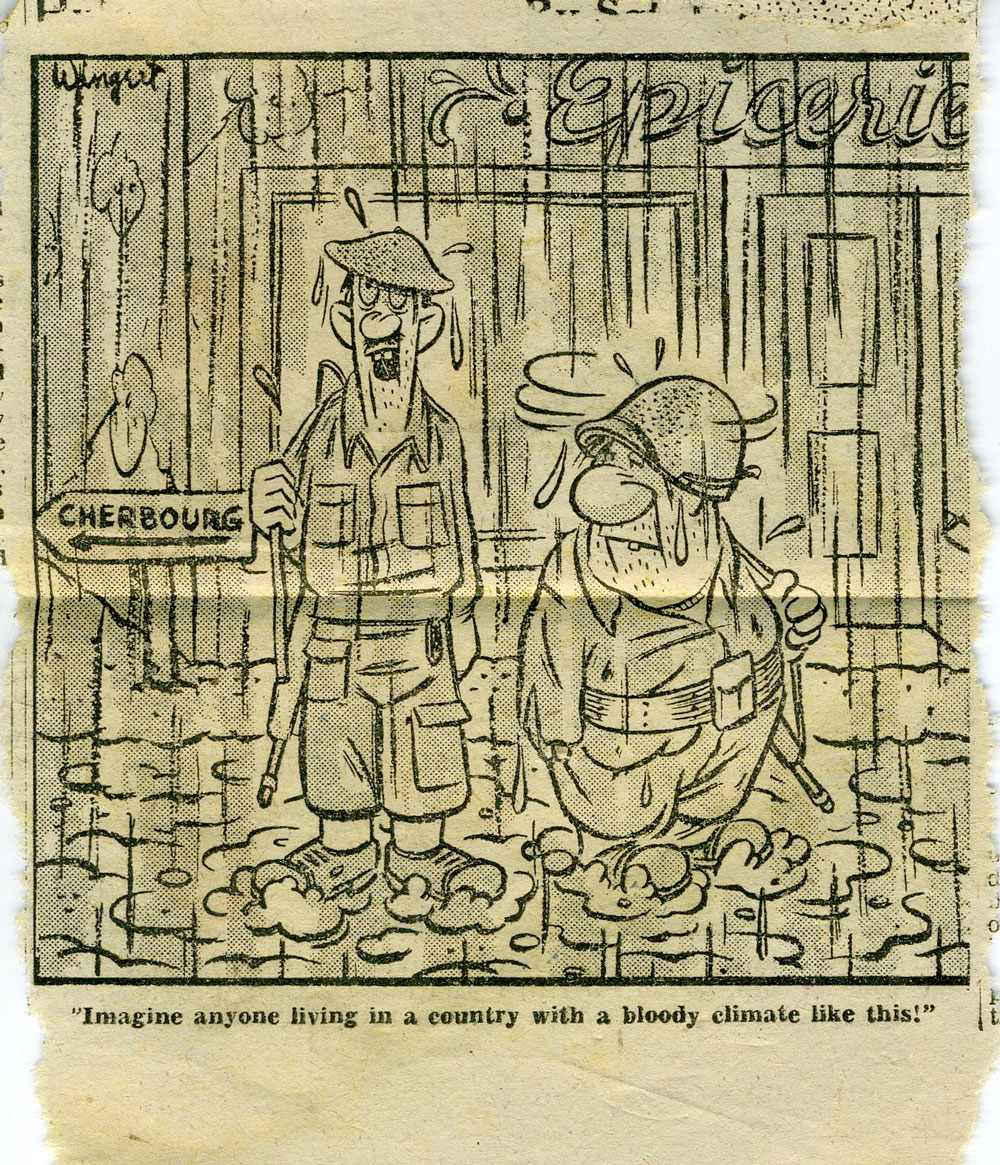
25 Jul On the move, August 25, 1944
This clipping was in my Dad’s letter along with the dried flowers he mentioned. I wasn’t sure at first which side of this was most important. Obviously to my Dad, the cartoon reflects his feelings. The map on the other side is very interesting as well.
25 Aug 1944
Letter #34 (I think)
Hey!! (26 Aug, 9am) 2 pkgs Arr!! yours with money belt, etc Anne’s of cookies. Thanks to both of you – more later Wheeee!
Hello, my darling – doggone, I’m afraid I’ve been neglecting you in the letter dept – but by golly, we get busier by the minute. (I started this at ten AM – it is now 5 PM – in the meantime I’ve been working – and up the road a piece to see Dinah Shore! She has a very good M/C, and a magician and a 2 piece band (one piano & a piano player – MC’s joke) with her. All very informal – and most enjoyable.
And I’ve just received ltrs #37 and Aug 13, Sunday (no #) and ain’t you the gal!! Really sounds fine – especially the part about time off to raise more family. Looks like I’ll have to go some to maintain my dignity in the financial Dept. Six To’ a year is a fair salary for a young gal to be making – and I presume as an editor you’ll get “billing”, too – hmm? Mighty fine. I hope you can talk Mercedes into coming up and living with us in the country. By the way, are you still with the same nice people as always? Or is that in some ltr I missed.
We have a fine place here now. A huge estate. The Madame is living in half the house, and our offices are in the other – but we live outdoors, as usual. We’re quite expert at this business of tearing down & setting up a bivouac area now – I’ll be a fine man to go on a camping trip with – I know some mighty neat tricks to add to one’s comfort & convenience. But you gotta broil the steaks. Lotsa steaks – for me & the kids – and you, too if you’re
Pg 2 a good girl.
I’m enclosing a coupla flowers (maybe they’re just weeds, I’m not sure) = but I thought they were kinda purity! Also a cartoon that will give you an idea of the kind of weather we’ve been having again for the past few days. (the short one is ME, of course). It’s been beautiful again today – but, golly, you should see those roads (the little side roads, that is – the main roads are very good) when it rains for a couple of days!
We’re moving so fast these days that a great many things are even more snafued than usual. Mail of course, is the most important to me – but fortunately your letters have been coming through fairly well. Main trouble is pkgs always wait. Mine must be tied up somewhere, as I’ve still not seen even one.
Gee, but I’m getting anxious to see you guys again. I think driving to the Coast would be a lot of fun. Of course, getting a car is the big problem – and could Karen take it in a car? Don’t you think we should go out there fairly soon after I get home, though? Personally, all i want to do is talk and play with you and Karen – but 8 years since I’ve seen Mom, and 7 years for Dad is too darn long for them.
Your new prospects (with reservations, perhaps, about travels to Sweden, etc) sound swell, baby. I’m very proud of you. But don’t work too hard, now. Be a good girl, sweetheart, cause I love you more than should be read by a censor – Pappy

A couple of side notes regarding the content of this letter: what is a “bivouac“? According to Wikipedia:
“A bivouac (pronounced /ˈbɪvuːæk/ biv-oo-ak) traditionally refers to a military encampment made with tents or improvised shelters, usually without shelter or protection from enemy fire or such a site where a camp may be built.”
As a way of trying to understand where my father’s unit may have been going at this point in the war, I searched online and found this clip from The U.S. Army:
Southern France 15 August – 14 September 1944
“The Allied invasion of southern France in the late summer of 1944, an operation first code-named ANVIL and later DRAGOON, marked the beginning of one of the most successful but controversial campaigns of World War II. However, because it fell both geographically and chronologically between two much larger Allied efforts in northern France and Italy, both its conduct and its contributions have been largely ignored. Planned originally as a simultaneous complement to OVERLORD, the cross-Channel attack on Normandy, ANVIL actually took place over two months later, on 15 August 1944, making it appear almost an afterthought to the main Allied offensive in northern Europe. Yet the success of ANVIL and the ensuing capture of the great southern French ports of Toulon and Marseilles, together with the subsequent drive north up the Rhone River valley to Lyon and Dijon, were ultimately to provide critical support to the Normandy-based armies finally moving east toward the German border.
The controversy that swirled around ANVIL one that has continued to the present, concerned not its timing or success, but its very existence. Opponents of ANVIL, including British Prime Minister Winston Churchill, have long argued that the invasion of southern France did little more than sap the strength of the main Allied campaign in the Mediterranean, the drive north up the Italian peninsula toward Austria and Hungary. This direct thrust through the so-called soft underbelly of German-dominated Europe might also, in retrospect, have altered the East-West balance of postwar Europe. In contrast, defenders of ANVIL, mainly Americans, have steadfastly maintained that even if the rugged Italian campaign could have been accelerated, the operational and logistical difficulties of rapidly crossing the Julian Alps would have been impossible to overcome. Far more significant to the Allied cause in Europe was the capture of Marseille, France’s largest port, and the rapid rehabilitation of the Rhone valley rail and road network. Until the opening of Antwerp in December 1944, this supply route was to satisfy over one-third of the Allied logistical needs in northern France. In addition, the Southern France Campaign resulted in the arrival of the third Allied army group opposite the German border, without which General Dwight D. Eisenhower’s army groups would have been stretched thinner and pressed harder during the German Ardennes offensive in the winter of that year. And a more grievous Allied setback in December might also have had dire consequences on postwar Europe for the Western Alliance.”
What’s interesting about this evolving puzzle is that I found in my Dad’s effects from the War, a brochure welcoming G.I.s to the Cote d’ Azur, which indicates that he eventually WAS in the South of France! Where he might be at this point in his journey, I’m still not sure.



No Comments